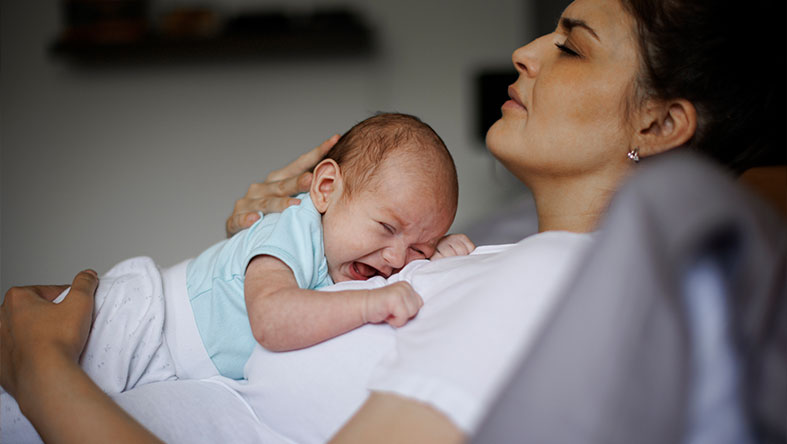You’re tired, you likely have some pain, and you’re now responsible for a new life. How do you do it?
The “postpartum period” starts after you give birth and lasts around 6 months. It is an important time for bonding with your newborn and for your health. While your baby is developing and growing, you are also recovering and adjusting.
Taking care of a newborn is beautiful but also very demanding. At CHPW, we understand the many challenges that come with pregnancy and parenting. Our Care Management team is here to support CHPW members at any point. We offer continuous assistance and resources to support a new or expecting parent’s well-being. Whether it’s scheduling postpartum check-ups, talking about mental health concerns, or finding community resources, we are here. Taking care of yourself is not a luxury. It’s a necessity for your well-being and your baby’s.
– Megan B., CHPW Care Management Manager
When we’re exhausted and doing our best to manage it all, little things are easy to overlook. Let’s focus on a few basics to take care of yourself and your newborn.
Taking care of yourself after childbirth
What do new parents most often forget when they bring their newborn home? That it is okay to not be okay. During this time, self-care, working with your care team, and asking for help are key.
Now that your little one is here, there are so many changes and new experiences! Seeing your doctor after delivery of your baby is just as important as during pregnancy as you continue to change. Your doctor can check on your physical and emotional wellbeing. They will also prepare you for the days ahead so you know what to expect, what you can do, and when to seek additional help. There is so much to take care of! Accepting help and taking care of yourself should be a priority.”
– Dr. Kyung L., MD, CHPW Medical Director and Family Medicine Physician
Taking care of your baby is also about taking care of yourself.
- Eat every meal. Good nutrition will help you have energy and recover from childbirth. Drink plenty of fluids, especially water, eat every meal, and have small snacks like fruits or nuts, if possible. If you’re breastfeeding, it’s best to avoid alcohol.
- Sleep whenever you get the chance. When your baby rests, try to sit quietly or take a nap. Playtime during the day may help your little one sleep more at night, which could mean more sleep for you!
- Listen to your body. While your new baby needs a lot of attention and care, you do too. Try to tune into your body and mind. Take a moment to think about yourself, what you might need, and how you can fit it into your day. Writing it down might help you keep it front and center.
- Ask for help. In the first few days after childbirth, if there is another safe adult that can stay with you, this will really help. If you live with a partner, keep communication open, and don’t try to do it all by yourself. Friends, relatives, or neighbors you trust may also be people you can ask for help and support.
- Schedule your postpartum checkups. You just did something really amazing and really hard. Your prenatal (pregnancy) care provider can make sure your body is recovering smoothly and give you advice on how to care for yourself. They will also talk to you about your emotional needs and connect you to other care if needed.
If you’re on Apple Health, you can schedule free rides to medical appointments. And, as a CHPW Apple Health member, also earn gift cards rewards for postpartum checkups for yours and your baby’s well-child visits.
- Monitor your feelings and emotions. Many new parents experience strong feelings or emotional struggles that make it more difficult to parent. Working with a counselor or mental health professional can help. If you’re not able to talk to your doctor about these feelings, call a resource hotline or connect with a counselor online. Perinatal Support Washington is a great place to check for online therapy and support groups.
Caring for your newborn
There are so many big things to know and decisions to make when you’re having a baby. Small things, that are really important when taking care of a newborn and keeping them safe, can easily get missed or cause worry.
Feeding
Many newborn parents worry if their little one is getting enough to eat.
During well-child checkups, your pediatrician will monitor your baby’s weight and help you make sure your baby is eating enough and at a healthy weight.
The Women Infants and Children (WIC) Nutrition Program provides access to no-cost healthy food, chest and breastfeeding support, and more, to people who are pregnant or recently pregnant, infants, and children under age five. To apply, find a WIC clinic online or call 1-800-322-2588.
Safety
Keeping baby safe while they sleep, ride in the car, while you hold them, and wherever you set them, can help you prevent accidents.
- To sleep, make sure you lay your little one on their back in a crib or their own safe sleep space free of loose blankets and toys. If you do co-sleep or bedshare, consider all possible risks before every sleep. Talk to your doctor about how to co-sleep safely.
- In the car, your baby’s car seat should be in the back seat and face the back window, and securely belted in. You’ll also want to make sure the harness fits snuggly. Also, remember, you should never leave your baby alone in the car, even for a small amount of time.
- To avoid falls and injuries, make sure you’re with your baby if they are on your bed or in a high place they could fall. Also remove things in your space you could slip on while holding baby, like rugs or clutter.
Babies, toddlers, and even adults all have accidents. Controlling what you can control is all you can do. Learn more ways to keep your newborn safe in this short video.
Doctor
In the first weeks after birth, your baby will need to see the doctor regularly for well-child visits. It’s important for your baby’s health to stay on track with these.
Routine checkups are a good time for parents to ask about what to expect in the weeks to come. Build a list of questions you have while at home, so you remember everything you want to ask at your baby’s checkup.
CHPW Apple Health members can earn gift rewards for completing well-child checkup. CHPW’s well-child checkup calendars.
Caring for a new baby and for yourself is not easy! Take breaks, do what you can to keep your little one safe, and ask for help. Remember, the better you care for yourself the better you can care for your little one. No matter what your situation is, you don’t have to do it all alone.
Learn more
Three tips for new mothers: Managing postpartum stress & strengthening your mental health
Office on Women’s Health: Your guide to breastfeeding
Find formula, diapers, and baby supplies near you: Go to Help Me Grow resource finder
Helplines you can call anytime:
- PPDMoms: 1-800-PPDMOMS (1-800-773-6667)
- National Hopeline Network: 1-800-SUICIDE (1-800-784-2433)
- National Strategy for Suicide Prevention LifeLine: 1-800-273-TALK (1-800-273-8255)



